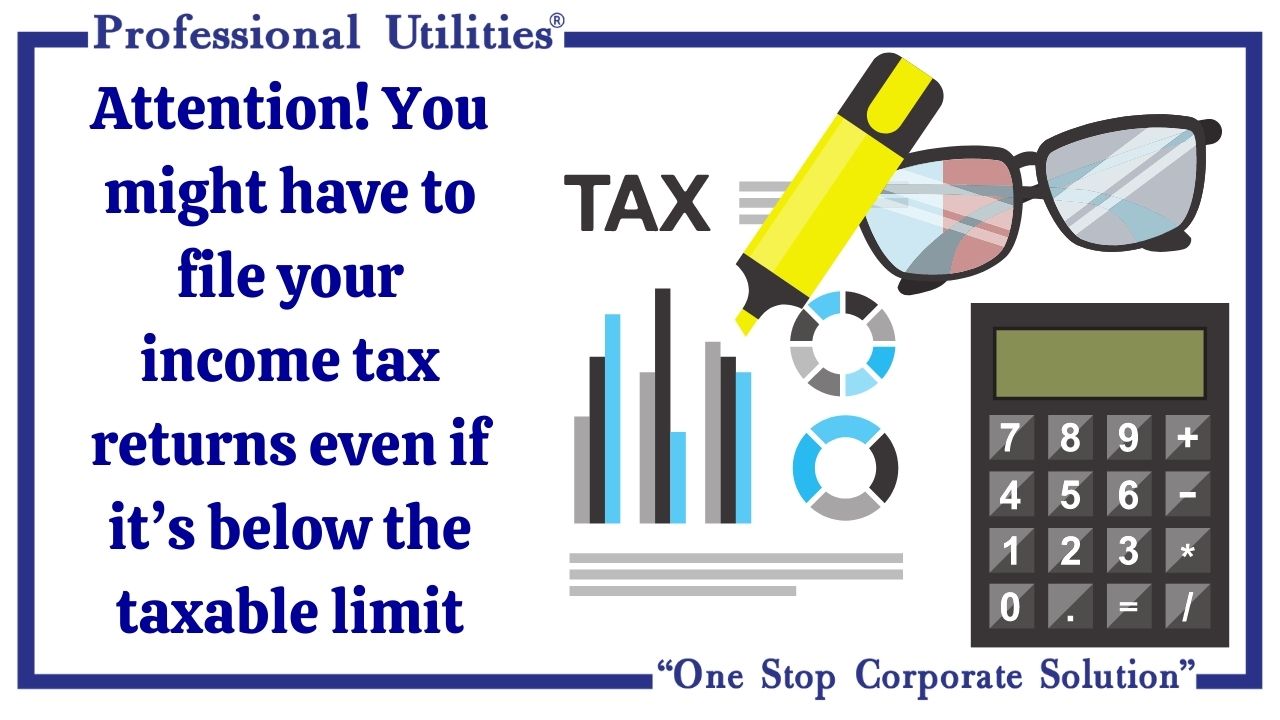
As indicated by section 139(1) of the Income Tax Act, an assessee needs to document an Income Tax Return (ITR) at the latest the due date of recording ITR, when the total income exceeds the maximum amount, which isn't chargeable to income tax. Anyone who is under 60 years old and has a yearly salary of more than Rs 2.5 lakhs needs to file income tax returns. For senior residents, the cut-off is Rs 3 lakhs, and for the individuals who are over 80 years of age, the cut off is Rs 5 lakhs.
In any case, Finance (No. 2) Act, 2019 has embedded another seventh provision to section 139(1) to accommodate obligatory filing of return of income for undertaking certain high-value transaction despite the fact that the individual is generally not needed to file a return of income because of the way that all out pay is underneath the essential exemption limit. The plan behind adding this stipulation is to gather data about taxpayers whose income declared and expenses acquired have gigantic variations.
Under the seventh proviso to Section 139(1) of the Income Tax Act, 1961, even if the income is below the exempted limit, a person will have to file ITR in case he or she meets any one of the following criteria:
- has deposited a sum or total of the sums surpassing one crore rupees in at least one current records kept up with a financial organization or a co-employable bank; or
- has incurred expenditure of a sum or total of the sums surpassing two lakh rupees for himself or some other individual for travel to a foreign country; or
- has incurred an expenditure of an amount or aggregate of the amounts exceeding one lakh rupees towards consumption of electricity; or
- fulfills such other conditions as may be prescribed,
- A brief discussion of the above-mentioned criteria is as follows:
Deposit of Rs. 1 crore or more in current accounts :
This covers a wide range of stores whether in cash or by cheque or through online exchange. Likewise, the deposits taken into consideration are the ones made in CURRENT records in particular. Bank accounts and different records are outside the domain of this provision.
Expenditure for Foreign Travel for more than Rs. 2 lakhs:
An exception has been included for this measures; foreign travel does exclude travel to neighboring nations or places of pilgrimage, as might be told by the duty office. Henceforth, such foreign travel doesn't satisfy the standards for documenting an ITR. It covers all the expenditure caused by an individual to head out to a far off nation for himself or some other individual. Consequently, the individual who incurs the expenditure might possibly head out to a far off nation.
Expenditure on the consumption of electricity for more than Rs. 1 Lakh:
The expenditure on the utilization of power is just secured under this provision. Expenses incurred for getting the electricity connection or deposits made with power authority are not secured. Additionally, if the individual has more than one electric association, all the expenses will be aggregated to decide the edge furthest reaches of Rs. 1 Lakh.
Other prescribed conditions:
CBDT is empowered to prescribe other conditions or high-value transactions under this seventh proviso. To date, no such conditions have been prescribed.
Note:-
- CBDT is empowered to prescribe other conditions or high-value transactions under this seventh proviso. To date, no such conditions have been prescribed.
- Previously, any person who claimed the benefit of exemption from capital gains tax was not required to file ITR provided his or her total income did not exceed the basic exemption limit after claiming such capital gains exemption under Sections 54 to 54GB of the Income-tax Act. However, post the Finance Act, 2019, an amendment to the sixth proviso to Section 139(1) of the Act now requires every person to calculate the threshold limit or basic exemption limit without giving effect to the exemption benefit under Sections 54 to 54GB. So, if your income before claiming exemption under Sections 54 to 54GB is more than the basic exempted limit, you will have to file ITR.
Why Professional Utilities?
At Professional Utilities, we leverage our industry knowledge and expertise to help businesses navigate complex regulations, minimize risks, and optimize operations for maximum efficiency and profitability.

One Stop Corporate Solution

PAN India
Services

Free Expert
Assistance

Google Verified
Business

Dedicated Support
Staff


.svg)








